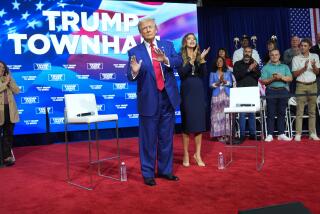Column: Donald Trump, our narcissist in chief, wants us to thank him for discovering Juneteenth?
How narcissistic is Donald Trump?
Let’s consider just the last week.
On Wednesday, he took credit for making “Juneteenth very famous,” insisting that prior to the insensitive scheduling of his Tulsa reelection rally on the day Americans celebrate the end of slavery, “nobody had ever heard of it.” (The mind reels.)
Trump also dismissed the warnings of health officials that holding his Tulsa rally in an enclosed arena while the coronavirus pandemic still rages potentially imperiled the health of thousands of his supporters. “It’s a very small percentage” of rally attendees who are likely to get sick, he said.
And he claimed that some of the people who wear masks to help curb the spread of COVID-19, which has killed 120,000 Americans and counting, are only doing so to signal their disapproval of him. (Face masks can substantially reduce the risk of transmission, scientists say.)
All those examples were from a single interview Trump gave to the Wall Street Journal on Wednesday, but they weren’t the end of his narcissistic displays.
On Thursday, during a week when the Supreme Court reaffirmed the civil rights of LGBTQ people, and refused to let the Trump administration destroy the lives of 700,000 “dreamers,” at least for the time being, Trump’s response was a self-absorbed classic: “Do you get the impression that the Supreme Court doesn’t like me?” he tweeted to his 82.2 million followers. A pair of decisions that affect millions of Americans, and Trump thinks they were all about him?
You’d really have to be a psychiatrist to understand how Trump thinks, but I really wanted to try. So I called Allen Frances, the former chairman of the department of psychiatry at Duke University’s School of Medicine. Frances, who lives in Coronado, Calif., chaired the task force that produced the fourth edition of the “Diagnostic and Statistical Manual of Mental Disorders,” or D.S.M. IV. The guy literally wrote the book on narcissistic personality disorder.
“In a historical context,” Frances told me Thursday, “I think Donald Trump may be the most narcissistic human being since Nero. His handling — or mishandling — of the pandemic and climate change is equivalent to Nero fiddling while Rome burned. He doesn’t care what happens to anyone but himself, and would be willing to have the whole country go down in flames if he feels himself stumbling.”
However, Frances does not believe Trump is sick. “It’s a mistake to call Trump crazy,” Frances said. “He’s an evil genius. There is a method to his madness. It’s directed toward self-aggrandizement, but it could not have worked if our society wasn’t crazy in the first place. He is appealing to our darkest angels.”
Three years ago, the New York Times published a letter from a group of mental health professionals warning of Trump’s “grave emotional instability.”
Frances took issue not just with diagnosing Trump from afar, but also with their conclusion.
“He may be a world-class narcissist,” he wrote to the New York Times in response, “but this doesn’t make him mentally ill because he does not suffer from the stress and impairment required to diagnose mental disorder.”
In his latest book, “Twilight of American Sanity: A Psychiatrist Analyzes the Age of Trump,” Frances writes that “Trump is a threat to the United States, and to the world, not because he is clinically mad, but because he is very bad.”
This year’s Juneteenth celebration is different: It comes as America wakes up to the illusion of the liberation of Black people.
Further, Frances writes, Trump is a symptom, not the cause, of what’s wrong with America. We are a society beset by delusions that Trump has brilliantly exploited, making statements like: “If the rich get richer, the benefits will trickle down to everyone else and the world will be a better place.” “The United States has the best healthcare system in the world.” “Our country can only be great again if we build walls around it.”
One thing that has had me puzzled about Trump is his aversion to masks, despite his reputation as a germaphobe. I wondered what Frances thought.
“Yeah, the mask thing is bizarre,” said Frances. “He’s always been afraid of germs, he wouldn’t shake hands, so why this sudden switch from phobic to counterphobic? Now he is going into crowded arenas? It almost suggests a death wish.”
As a layperson, I wouldn’t know, but as Trump struggles in the polls, and may be in the position of taking his party down with him if he loses in November, it does seem he is becoming more and more impulsive, if not desperate.
“He is a wounded animal, and is therefore most dangerous now,” said Frances. “I wouldn’t be surprised at anything he does, including throwing family members off the boat.”
In two weeks or so, we will know whether Trump’s indoor Tulsa ego-boost was a disaster for public health or a boon for his reelection. Or perhaps it will be both.
“It’s an amazing gamble,” said Frances. “If he winds up killing people who are Trump supporters, and they realize Grandma is dead because of a Trump rally, that might shake them up. He said he could stand on Fifth Avenue and shoot someone and not lose voters, and he was right. But that’s true until it’s your own grandmother. Although some might be willing to sacrifice Granny because they love him so much.”
@AbcarianLAT
More to Read
A cure for the common opinion
Get thought-provoking perspectives with our weekly newsletter.
You may occasionally receive promotional content from the Los Angeles Times.












